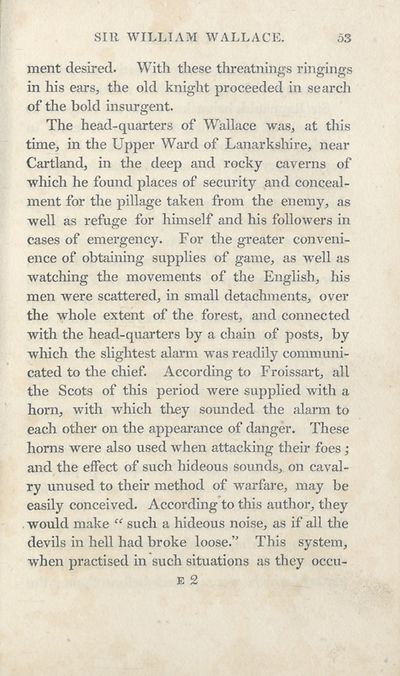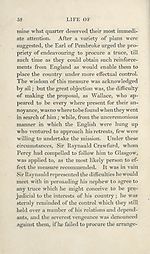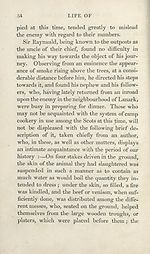Download files
Complete book:
Individual page:
Thumbnail gallery: Grid view | List view

Silt WILLIAM WALLACE.
ment desired. With these threatnings ringings
in his ears, the old knight proceeded in search
of the bold insurgent.
The head-quarters of Wallace was, at this
time, in the Upper Ward of Lanarkshire, near
Cartland, in the deep and rocky caverns of
which he found places of security and conceal¬
ment for the pillage taken from the enemy, as
well as refuge for himself and his followers in
cases of emergency. For the greater conveni¬
ence of obtaining supplies of game, as well as
watching the movements of the English, his
men were scattered, in small detachments, over
the whole extent of the forest, and connected
with the head-quarters by a chain of posts, by
which the slightest alarm was readily communi¬
cated to the chief. According to Froissart, all
the Scots of this period were supplied with a
horn, with which they sounded the alarm to
each other on the appearance of danger. These
horns were also used when attacking their foes;
and the effect of such hideous sounds, on caval¬
ry unused to their method of warfare, may be
easily conceived. According to this author, they
would make “ such a hideous noise, as if all the
devils in hell had broke loose.” This system,
when practised in such situations as they occu-
ment desired. With these threatnings ringings
in his ears, the old knight proceeded in search
of the bold insurgent.
The head-quarters of Wallace was, at this
time, in the Upper Ward of Lanarkshire, near
Cartland, in the deep and rocky caverns of
which he found places of security and conceal¬
ment for the pillage taken from the enemy, as
well as refuge for himself and his followers in
cases of emergency. For the greater conveni¬
ence of obtaining supplies of game, as well as
watching the movements of the English, his
men were scattered, in small detachments, over
the whole extent of the forest, and connected
with the head-quarters by a chain of posts, by
which the slightest alarm was readily communi¬
cated to the chief. According to Froissart, all
the Scots of this period were supplied with a
horn, with which they sounded the alarm to
each other on the appearance of danger. These
horns were also used when attacking their foes;
and the effect of such hideous sounds, on caval¬
ry unused to their method of warfare, may be
easily conceived. According to this author, they
would make “ such a hideous noise, as if all the
devils in hell had broke loose.” This system,
when practised in such situations as they occu-
Set display mode to:
![]() Universal Viewer |
Universal Viewer | ![]() Mirador |
Large image | Transcription
Mirador |
Large image | Transcription
| Antiquarian books of Scotland > Scotland/Scots > Life of Sir William Wallace, Knight of Ellerslie, and Guardian of Scotland > (67) |
|---|
| Permanent URL | https://digital.nls.uk/122055075 |
|---|
| Description | Thousands of printed books from the Antiquarian Books of Scotland collection which dates from 1641 to the 1980s. The collection consists of 14,800 books which were published in Scotland or have a Scottish connection, e.g. through the author, printer or owner. Subjects covered include sport, education, diseases, adventure, occupations, Jacobites, politics and religion. Among the 29 languages represented are English, Gaelic, Italian, French, Russian and Swedish. |
|---|

